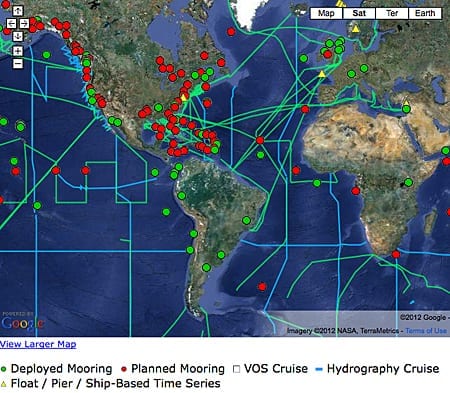By Daniel de la Calle
Media Matters for America (by “America” they mean the USA) released a study last week showing the “Kardashians get 40 times more news coverage than Ocean Acidification”, which was great news for the Kardashians, for Ocean Acidification and for me. For me because I finally got to see some pictures of these young and beautiful women, for the Kardashians because their name-brand was mentioned once again and it will all be helpful launching a new line of lingerie and for Ocean Acidification because linking it to the Kardashians to denounce (yes, never mind the paradox) what the media and us the public are interested in will attract residual curiosity and subsequent knowledge of the dangerous pH drop in the world’s waters. I do not see any reason why when cars, home insurances or mineral waters are sold beside the image of attractive feminine figures science and environmental threats should not follow suit. The connection in the case of Ocean Acidification is, I believe, much more obvious:
Ocean Acidification=decalcifying low pH=loss in biodiversity and extinctions
Kardashians=sexual desire=reproduction=abundant breast milk with tons of calcium
You probably want to read more about it, so HERE.
But there have been other news about Ocean Acidification that caught my eye:
≈Washington State oyster grower moves hatchery to Hawaii.
“After 34 years rearing shellfish in Willapa Bay, Dave Nisbet was in a bind: Nature had stopped providing.
Oysters were no longer reproducing naturally on the Washington Coast. Oyster larvae were even dying in nearby hatcheries, which use seawater to raise baby shellfish that get sold as starter seed to companies like Nisbet’s Goose Point Oysters.
But when, in 2009, Nisbet heard oceanographers identify the likely culprit — increasingly corrosive ocean water, a byproduct of the same greenhouse gases that contribute to global warming — the oysterman did the unthinkable.
Nisbet took out a loan and spent three years testing and building a new hatchery that opened recently. In Hawaii.” READ MORE OF THIS SEATTLE TIMES ARTICLE
≈Continuing with sexuality and reproduction, on occasions scientific research is devoted to the specifics: Check this study on the “Effects of Ocean Acidification on Motility and Swimming Speed of Sea Urchin Sperm“.
≈A recently finished international workshop at the University of Washington (Seattle) has tried to create an Ocean Acidification Observing Network of Ship Surveys, Moorings, Floats and Gliders in the seas. READ MORE
≈Jan Vicente, Graduate student at the Institute of Marine and Environmental Technology has been awarded the pretigious Dr. Nancy Foster Scholarship to study the effects of Ocean Acidification on sponges.
“Research efforts have focused on the impact of ocean acidification on corals, while there is a lack of research on the impact it may have on how sponges build their skeletons. Vicente will study how increased concentrations of carbon dioxide are affecting the sponges’ ability to synthesize spicules and collagen fibers that make up their skeleton.
He will be monitoring the silicatein and collagen genes of two common Florida Keys sponges in particular, the Black Ball Sponge and the Red Vase Sponge, under simulated ocean acidification conditions. In addition, he will study the bacterial communities that live on the sponges to determine if they can serve as biological indicators of environmental stressors, such as ocean acidification and climate change.
Sponges are an integral part of coral reefs, accounting for as much as 60% of some coral reefs in the Caribbean. The most common sponges found in coral reefs are responsible for filtering the water and returning essential nutrients to the reef.”
SOURCE
≈Richard Feely, Senior Scientist at NOAA, talks to Pavilion TV at RIO+20 about the consequences of Ocean Acidification in marine life sustainability and the availability of fish for people’s diets:
Rio+20: Richard Feely, Senior Scientist at U.S National Oceanic & Atmospheric Administration from Responding to Climate Change on Vimeo.
≈The second half of the video posted earlier this week titled “RIO+20: Addressing Ocean Acidification”:
Video streaming by Ustream
≈A video on Ocean Acidification by the UNEP (United Nations Environment Programme):
≈And yet another documentary short on Ocean Acidification “made as an AP Environmental Science project” found on Youtube:


